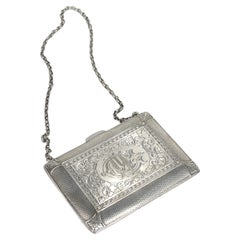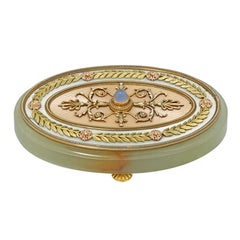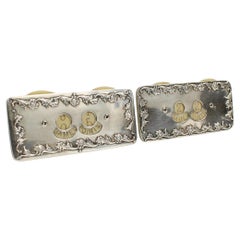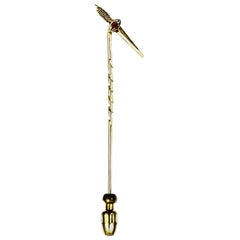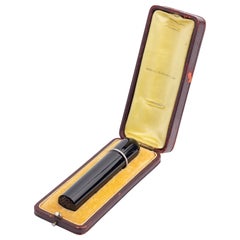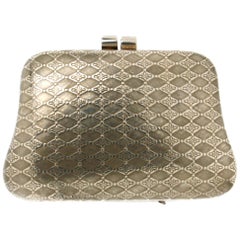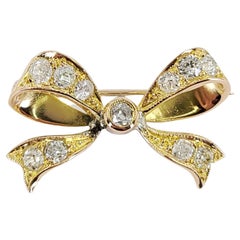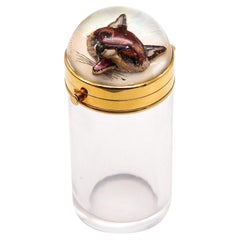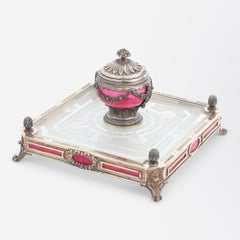Edwardian More Objets d'Art and Vertu
Antique Edwardian jewelry is named for King Edward VII of Great Britain, who ruled from 1901 until 1910. Classic Edwardian necklaces, engagement rings, earrings and other jewelry are often overshadowed by the more popular style of the era, Art Nouveau, which is a shame. At its best, Edwardian jewelry was all about the exquisite diamond, platinum and pearl creations made by such famous names as Cartier and Boucheron.
Edward introduced incredibly formal Buckingham Palace court presentations, balls and soirées, resulting in a huge demand for diamond jewels starting with his coronation in 1902. Dozens of tiaras and formal jewels in an updated 18th-century style were purchased from French jewelers Boucheron and Chaumet and from Russia’s Fabergé. The court jewelers Asprey, Garrard, Carrington and the newly opened London branch of Cartier were all overwhelmed with orders for sumptuous diamond jewelry to be worn at the king’s elaborate coronation.
During the Edwardian era, pearls were more valuable than diamonds. The pear-shaped pearl La Peregrina, for example, belonged to some of the most fabulous and strongest women in history and bounced among royal courts in Spain, France and Russia for several centuries. So while today the scale and clarity of a diamond ring matters, back then the size and quantity of your pearls was more important a declaration of wealth. And just as Victorian notions of propriety and femininity began to change after Queen Victoria died in 1901, jewelry design also evolved but there was some overlap with late Victorian styles.
Women of the Edwardian period sported bejeweled headpieces like tiaras and bandeaus with feathered aigrettes. Another popular piece of jewelry that is said to have been directly inspired by Queen Alexandra were colliers de chien, or dog collars — today's choker necklaces — which consisted of either a ribbon decorated with a brooch, a gemstone or several strands of pearls strung closely together.
Two major jewelry houses, Cartier and Boucheron, were founded in the mid-1850s, and by the beginning of the 20th century, the wealthy considered them household names. The Cartier brand became even more desirable once the house became the official jewelry supplier to King Edward VII. Cartier took this title seriously and designed some of the most innovative jewelry of its day, since it was willing to experiment with new materials like platinum and because it was mindful of fashion trends. Filigree settings also became popular. This saw-piercing technique was decorative and at the same time created a sense of lightness.
Perhaps even more important than Cartier’s use of platinum was the founding of De Beers Consolidated Mines Limited in 1888. The discovery of new diamond mines made the stone more affordable and prompted the introduction of new gemstone cuts. It is not uncommon to see Edwardian jewels with baguette or briolette diamonds.
Find antique Edwardian rings, bracelets, watches and other jewelry on 1stDibs.
Early 20th Century American Edwardian More Objets d'Art and Vertu
Sterling Silver
Early 20th Century Edwardian More Objets d'Art and Vertu
Chalcedony, Yellow Gold
20th Century American Edwardian More Objets d'Art and Vertu
Sterling Silver
Early 1900s British Antique Edwardian More Objets d'Art and Vertu
Diamond, Ruby, Gold, 18k Gold, 9k Gold
Early 20th Century French Edwardian More Objets d'Art and Vertu
Diamond, Onyx
1950s Italian Vintage Edwardian More Objets d'Art and Vertu
Silver
Late 19th Century Antique Edwardian More Objets d'Art and Vertu
Diamond, 18k Gold, Yellow Gold
Early 20th Century British Edwardian More Objets d'Art and Vertu
21st Century and Contemporary Edwardian More Objets d'Art and Vertu
18k Gold, Yellow Gold
21st Century and Contemporary Hong Kong Edwardian More Objets d'Art and Vertu
Diamond, Garnet, Ruby, Pink Sapphire, 18k Gold, Rose Gold
1850s French Antique Edwardian More Objets d'Art and Vertu
Silver
Late 20th Century Edwardian More Objets d'Art and Vertu
Diamond, Blue Sapphire, 18k Gold, Yellow Gold, Enamel
1960s French Vintage Edwardian More Objets d'Art and Vertu
18k Gold, Yellow Gold, Gold
1890s Russian Antique Edwardian More Objets d'Art and Vertu
Early 2000s German Edwardian More Objets d'Art and Vertu
Diamond, 18k Gold
1920s French Vintage Edwardian More Objets d'Art and Vertu
Diamond, Jade
1920s French Vintage Edwardian More Objets d'Art and Vertu
Amazonite, Jade, Onyx, Sapphire, Gold, 18k Gold, Yellow Gold
Early 1900s American Antique Edwardian More Objets d'Art and Vertu
Quartz, Rock Crystal, Gold, 18k Gold, Yellow Gold, Enamel
Early 20th Century French Edwardian More Objets d'Art and Vertu
Silver, Enamel
Early 20th Century British Edwardian More Objets d'Art and Vertu
Diamond, Pearl, Gold, 18k Gold, Gold Plate, Yellow Gold
Early 20th Century Unknown Edwardian More Objets d'Art and Vertu
Pearl, Gold, Enamel
Early 1900s Austrian Antique Edwardian More Objets d'Art and Vertu
Bronze, Enamel
1940s British Vintage Edwardian More Objets d'Art and Vertu
9k Gold, Yellow Gold
Early 1900s British Antique Edwardian More Objets d'Art and Vertu
Diamond, Gold
Early 19th Century Swiss Antique Edwardian More Objets d'Art and Vertu
Turquoise, 18k Gold
Early 20th Century Edwardian More Objets d'Art and Vertu
Diamond, Blue Sapphire, 14k Gold, Silver
Early 20th Century Edwardian More Objets d'Art and Vertu
14k Gold, Yellow Gold
Early 20th Century Russian Edwardian More Objets d'Art and Vertu
14k Gold, Silver
20th Century American Edwardian More Objets d'Art and Vertu
Ruby, 14k Gold
